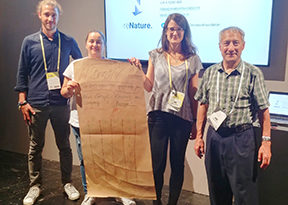Environmental journalists around the world face physical, legal, emotional and economic perils for doing their work. Meanwhile, more than 25 years after the USSR collapsed, the Soviet legacy of environmental degradation still plagues the 15 countries that emerged from its dismantled empire.

Eric Freedman with agroforestry workshop team members at the “me Convention” in Frankfurt
Those were the broad stories that Knight Center director Eric Freedman told during two presentations at the recent “me Convention” in Frankfurt, Germany. The convention featured a wide variety of international speakers on technology, education, futuristic visions, exploration, diversity, entrepreneurship, story-telling, science fiction and societal changes.
In “At Distant Ends of the Soviet Empire: Environmental Challenges Today,” Freedman focused on major ecological problems in three parts of the former Soviet Union – overfishing in the Baltic Sea, poaching and illegal logging in the Republic of Georgia and the near-death of the Aral Sea in Central Asia. The presentation drew on his teaching, professional trainings and research as a Fulbright Scholar in Uzbekistan, Lithuania and the Republic of Georgia.
Those problems are representative of wide-ranging environmental legacies of the 70 years of the Soviet regime, including nuclear contamination, toxic wastes from industrial facilities, soil salinity, deforestation, habitat destruction, oil and gas drilling, mining and overdevelopment. Policies, practices and mindsets of that era remain huge barriers to environmental sustainability, and most of the 15 new countries that emerged from the ruins of the USSR lacked the financial means, political will, public support and technical expertise to stem, let alone reverse, decades of the spoliation of natural resources, destruction of habitats and crumbling infrastructure.
For Freedman’s second presentation, he used the experiences of four journalists to illustrate the dangers environmental journalists confront around the world. Rodney Sieh was imprisoned and fined for reporting on corruption in a public health project in Liberia. Bartholomaeus Grill was detained and threatened with death for reporting on rhino poaching in Mozambique. Miles Howe was arrested for reporting on First Nations protests against oil and gas exploration in Canada. Abeer Saady was physically attacked for reporting on toxic dumping into the Nile River in Egypt.
Some of their colleagues have been killed for their work. Those who survived arrest, assault, threats, self-exile, lawsuits and harassment have suffered physical, emotional and financial ramifications. Some have left journalism as a result, although others discovered that adversity strengthened their sense of mission.
During the me Convention, Freedman participated in other sessions, including a workshop on how to use “design thinking” to develop agroforestry projects that could promote sustainability and food security by replacing tree monoculture and overdependence on irrigation and chemicals. In that session led by Felipe Villela, the founder of reNature, teams of participants sketched out ideas that could integrate the growing of food crops, timber and biomass in a variety of countries.
In another workshop session, Ari Popper, the founder of SciFutures, demonstrated how businesses can use science fiction storytelling to envision and help plan their own futures.
